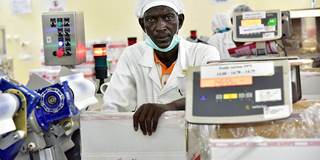Health innovations from the world’s poor countries have passed the test of scalability and applicability in the places that need them most. With most of the world’s population living in resource-challenged settings, investment in those who are pushing the frontiers of medical science in the developing world would yield high returns.
DHAKA – We live in an age of tragic health paradoxes. Mass immunization campaigns have eliminated entire diseases, but children in countries like Haiti and Bangladesh continue to die of easily treatable diseases caused by common pathogens. Globalization has lifted millions of people out of extreme poverty, but has left them exposed to the non-communicable diseases of the post-industrial age – from diabetes to heart disease – in countries that lack the resources to treat them.
Underlying these paradoxes is yet another: the vast majority of health research is conducted in wealthy economies, but the vast majority of the global public-health burden falls on low- and middle-income countries. There is something grossly inefficient – even immoral – about this allocation of resources, which undermines the development of health solutions for those who need them most.
To be sure, it was possible to address the first generation of global development problems with straightforward transfers of capital and solutions from rich to poor countries. Examples include programs to boost primary-school enrollment and, in public health, mass immunization campaigns.

DHAKA – We live in an age of tragic health paradoxes. Mass immunization campaigns have eliminated entire diseases, but children in countries like Haiti and Bangladesh continue to die of easily treatable diseases caused by common pathogens. Globalization has lifted millions of people out of extreme poverty, but has left them exposed to the non-communicable diseases of the post-industrial age – from diabetes to heart disease – in countries that lack the resources to treat them.
Underlying these paradoxes is yet another: the vast majority of health research is conducted in wealthy economies, but the vast majority of the global public-health burden falls on low- and middle-income countries. There is something grossly inefficient – even immoral – about this allocation of resources, which undermines the development of health solutions for those who need them most.
To be sure, it was possible to address the first generation of global development problems with straightforward transfers of capital and solutions from rich to poor countries. Examples include programs to boost primary-school enrollment and, in public health, mass immunization campaigns.